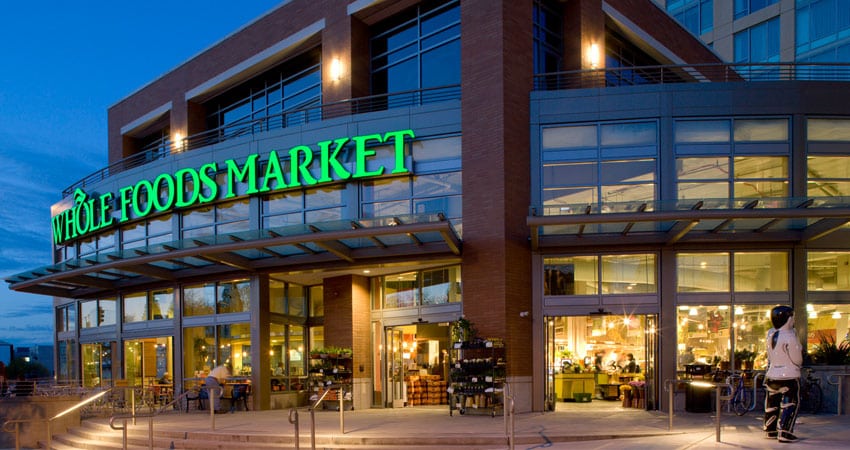Dropping a bombshell into the marketplace on a Friday, Amazon today announced its plans to acquire Whole Foods in a cash deal worth $13.7 billion, its biggest deal to date, blowing out Amazon’s bricks-and-mortar agenda and sending shock waves across both the retail and grocery sectors.
This gives Amazon a huge entre into the hyper-competitive grocery market, which it has been trying for years to crack into without as much success as in other categories. It’s also not hard to imagine Amazon wedding its growing logistics capabilities, 63 million U.S. Prime memberships and voice-based Echo devices to Whole Foods, cementing a further hold on U.S. consumers. Whole Foods operates 431 stores in 20+ states.
“Millions of people love Whole Foods Market because they offer the best natural and organic foods, and they make it fun to eat healthy,” said Jeff Bezos, Amazon founder and CEO in a release. “Whole Foods Market has been satisfying, delighting and nourishing customers for nearly four decades – they’re doing an amazing job and we want that to continue.”
“This partnership presents an opportunity to maximize value for Whole Foods Market’s shareholders, while at the same time extending our mission and bringing the highest quality, experience, convenience and innovation to our customers,” said John Mackey, Whole Foods Market co-founder and CEO in the release.
Whole Foods will maintain its branding and its Austin, TX headquarters, and Mackey will remain as its CEO. The acquisition is expected close in the second half of 2017.
Colin Sebastian, a senior equity research analyst with Robert W. Baird, said in a research note that Amazon sees grocery as an important long-term growth driver, giving it scale and density that otherwise would’ve taken years to build out.
“We also expect Amazon to connect Prime memberships, including Prime Now and last-mile delivery, forging a dual-track grocery strategy,” Sebastian said. “Moreover, we believe that grocery is a key element of Amazon’s strategy to drive transactions through Echo devices and other connected IoT devices such as refrigerators.”
While the deal might first seem at odds with Amazon’s ecommerce ambitions, Sebastian said that Whole Foods’ focus on the customer experience and healthy, quality products “should accelerate the pace of online grocery penetration, and presumably increase the value proposition for Prime members, as Whole Foods’ physical assets can be leveraged for Amazon’s broader retail distribution initiatives like Prime Now and Prime Fresh.”
“With Amazon’s acquisition of Whole Foods the retail wars which has been going on for a while in apparel and electronics have now spread to groceries,” said Mighael Botha, CTO of Software AG. “Although Amazon has had groceries and gourmet food under their AmazonFresh and Prime Pantry offerings for some time, the addition of brick-and-mortar opens a new frontier for them to dominate the grocery business as well. It will be interesting to watch what changes Amazon implements at Whole Foods stores to move the company from a traditional grocery chain to a 21st century enterprise.”
David Spitz, CEO of ChannelAdvisor, said in a blog post that the deal made a lot of sense on several levels for Amazon and Whole Foods as the grocery sector was one “ripe for digital disruption.”
“The number of hours people spend shopping at a grocery store is staggering and dwarfs other retail ‘share of time’ for consumers,” Spitz said. “Although Whole Foods’ share of the market is still relatively small, so was Amazon’s when it decided to get into books back in the 90’s. Also the culture at Whole Foods is highly customer-centric, much like Amazon. And there’s likely significant overlap in their respective customer bases — higher-income, urban-centric consumers who value convenience, reliability and quality.”
Tushar Patel, CMO of Kibo, saw the deal as accelerating Amazon’s ability to offer buy online, pick up in store or same-day delivery in the grocery space.
“Our latest research indicates 66% consumers expect BOPIS fulfillment options and 55% are willing to switch retailers if this option is not available,” Patel said. “Brick and mortar isn’t dead, it’s just disrupted at this point. Now that Amazon can sell more product on those same day purchases, and include Amazon product in Whole Foods stores, the sky is the limit for them.”

